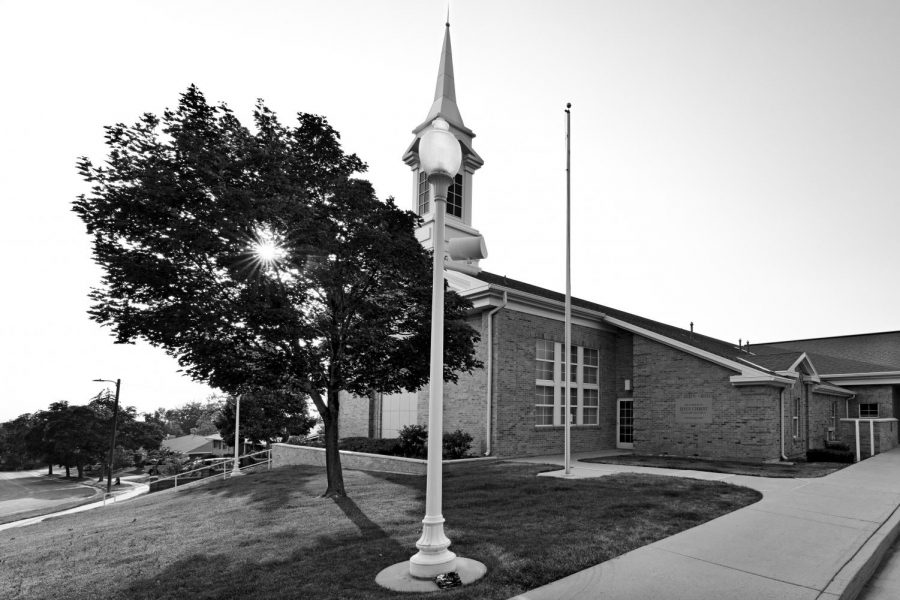Soter: Salt Lake City’s Mormon Culture Encourages Plastic Surgery
Local Mormon church near Foothill Drive on Sunday, July 11, 2021. (Photo by Kevin Cody | The Daily Utah Chronicle)
October 28, 2021
I didn’t grow up Mormon but I did grow up in Utah, so I’ve been around Mormon culture my entire life. The pressure Mormonism puts on appearance, particularly female appearance, has always astounded me. It wasn’t until talking to Meg Conley, a woman who grew up in the LDS faith and has used that experience to become a freelance writer and social media influencer, that the pressure I observed was articulated.
Mormon culture puts an extreme emphasis on female appearance. That emphasis usually reveals itself in the form of physical altercation, more commonly plastic surgery. What makes this cultural mindset unique is the negative effect it has on both the women in and out of the culture. If you’ve ever driven down I-15, you may know what I’m referring to. The highway is lined with billboards that say things like “friends don’t let friends muffin top” or “size matters.” The amount of plastic surgery billboards that Salt Lake broadcasts on their highways is normal, right? Wrong.
There are 6 plastic surgeons for every 100,000 people in Utah. An unsurprising statistic when considering that two-thirds of Utah Mormon women admit to knowing someone who has received some form of a cosmetic altercation. Contextually, Vice reports that Salt Lake City’s high number of plastic surgeons is “2.5 times more than every other city of its size.” No wonder Forbes named Salt Lake “America’s vainest city.”
And perhaps most interesting of all is that the pressure for Mormons to get plastic surgery is unique to the state. Conley, who grew up in California, moved to Utah, and then moved back to California said she only felt pressured to get plastic surgery when living in Utah. “It’s absolutely a phenomenon happening within the state.” She went on, “You could go to a Mormon ward on the east coast or in Canada and find toxic expectations, but it’s not like it is in Utah.
Ironically, Mormon doctrine says the body is a temple and that it doesn’t need to change. But, Utah’s culture tells a different story and so does the state’s plastic surgery rates. “There is a specific tie in Utah culture that is not said, but felt, the way that you appear on the outside is a reflection of how your soul is doing.” According to Conley, a reason for that could be traced back to Mormon Culture’s desire to assimilate in the 1950s. “As Mormons assimilate and they’re converted to the American dream and all that jazz, it’s no longer building a community that’s like heaven, it’s making your home like heaven, and wouldn’t a goddess have a small waist and big boobs?” In this society, yes.
Pregnancy is another factor in Mormon culture that may be influencing plastic surgery rates. Mormon women are taught from a young age that their purpose is to have children. Mormons have more children than any other U.S. religious group. Because of the cultural emphasis on childbearing, many young women have children at a young age before they themselves are really “grown-up.”
Commonly, these women aren’t having one or two children but three or four, in succession. Multiple pregnancies in a short period of time affect the body, leaving breasts saggy and stomachs that aren’t flat. This leads to what a lot of people in the plastic surgery industry refer to as “mommy makeovers,” and because there are so many Mormon “mommies” it’s unsurprising that plastic surgery is popular in Utah.
Conley knows from experience. “I feel like my face got tired faster than some of my peers, because it’s really hard to have a bunch of kids in your twenties. It feels like I got that line between my nose and eye earlier than I would have because I was squinching up my face trying to figure out how to afford groceries for a family when I was 24.”
Conley admits that she isn’t against the idea of getting that line removed, and she shouldn’t be. Plastic surgery is a facet of body autonomy, and body autonomy is never a bad thing. But being forced into it because of cultural pressure is. Openly discussing that pressure will empower more Utah women to get plastic surgery because they want it, not because they need it to feel accepted by their society.









Amy • Aug 1, 2023 at 11:08 am
Just found this article thanks to Reddit and it’s totally spot on. Haters gon’ hate. Utah’s more plastic than a Texas-sized warehouse full of Barbie dolls. Don’t forget the teeth whiteners and hair bleach, too!
Bryce • Oct 31, 2021 at 9:49 am
This is pretty interesting considering you have no actual statistical evidence that those receiving plastic surgery are actually members of that religion. You are just basing this off of living in Salt Lake City and seeing billboards? I think you need to get out more. Is is any coincidence that the further you get away from SLC, those billboards diminish to nothing? And that SLC and immediate vicinity happen to be the one area in Utah with the most diversity and smallest population of those from the LDS religion? Next time do a little background work and give us some grown-up scientific evidence before bashing on someone’s religion. You obviously have insecurities that you have never come to terms with.
KRISTEE KONEKSY • Oct 30, 2021 at 10:04 am
Who is this guy that wrote this???? He’s not living in reality!!!! I think he only wrote this to start an argument. Not ONE thing he said is correct. Not one. There are so many crazy people in the world!!!! Pick and choose who you will believe!!!! But this is COMPLETELY NOT TRUE!
Dee Gilbert • Oct 29, 2021 at 4:37 pm
I was born in California. My husband and I lived the majority of our 46 years together in California. In the almost 8 years that we have lived in Utah, I have never felt pressured to have, nor have I received any plastic surgery. I do know a few people in my community who have chosen to have a nip, tuck, or augmentation, but I knew many more in California who chose the plastic path. In addition, my California female friends and family are much more likely to have fake nails, dyed hair, and lash extensions. The person who wrote this article must run with a much more affluent crowd than I do, because in my opinion, choosing to have plastic surgery has much more to do with how much money you have to waste than it has to do with peer pressure. Personally, I would rather go on a fabulous vacation than throw money at a plastic surgeon.
Steve • Oct 29, 2021 at 10:14 am
As a University of Utah alumnus I am ashamed to see this kind of garbage here. I’m not agreeing or disagreeing with the content of the article, but the lack of quality and responsibility in this writing is absolutely ridiculous. If this is the best Soter can come up with to antagonize The Church of Jesus Christ of Latter-day Saints without providing any shred of causational evidence, I would say the Church is in a pretty good position. I would also expect a second-year English student who grew up in Utah to be able to use correct English vocabulary. Utterly shameful.
Karen • Oct 29, 2021 at 5:25 am
“physical altercation”? That can’t be the correct word, can it?
And I am of the generation of women that having your ears pierced was discouraged.
I am highly skeptical of the assumptions being made here.
Melissa • Oct 30, 2021 at 4:24 pm
Ha ha. Exactly. I believe she is intending to say “alteration”. It’s difficult to take the article seriously when such a basic and integral word in the article is misused.
anongirl123 • Mar 24, 2024 at 5:28 pm
physical alteration vs. physical altercation (physical assault) is essentially the same thing! lol
Jennifer Longshaw • Oct 28, 2021 at 7:27 pm
This is such made up garbage. There is never any pressure to have any kind of plastic surgery. I’ve lived in Utah for 20 years and not once have I heard of anyone getting plastic surgery or being pressured to think they need it.
Janice • Oct 28, 2021 at 4:32 pm
This is total BS